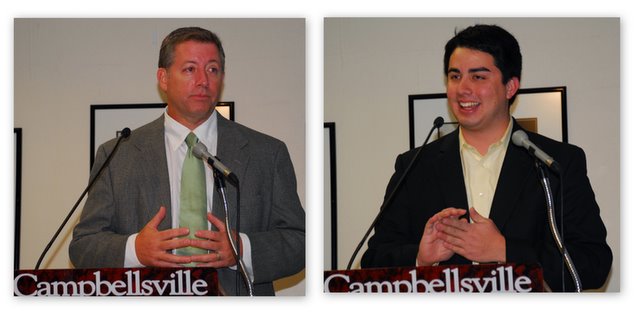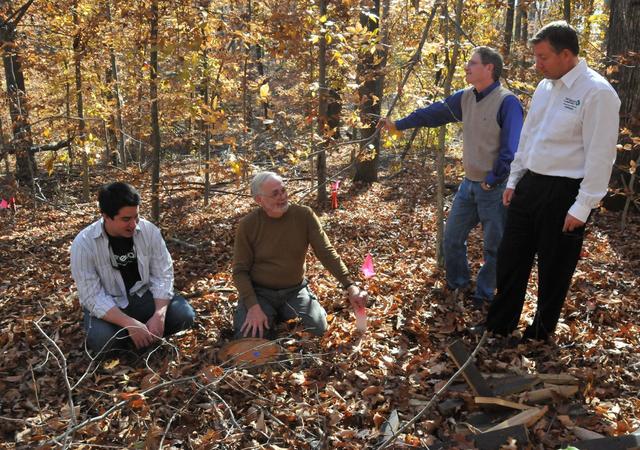| ||||||||||
Dr. Ronald P. Rogers CHIROPRACTOR Support for your body's natural healing capabilities 270-384-5554 Click here for details 


Columbia Gas Dept. GAS LEAK or GAS SMELL Contact Numbers 24 hrs/ 365 days 270-384-2006 or 9-1-1 Call before you dig Visit ColumbiaMagazine's Directory of Churches Addresses, times, phone numbers and more for churches in Adair County Find Great Stuff in ColumbiaMagazine's Classified Ads Antiques, Help Wanted, Autos, Real Estate, Legal Notices, More... 

|
KHIPP forum urged to take care of dying planet Campbellsville University's work at Green River, a national and global treasure, lauded at Earth Stewardship Forum. Author Ben Lowe and Terry Cook, State Director of the Nature Conservancy are guest speakers at Tuesday, November 9, 2010 event. Click on headline for story plus photos By Joan C. McKinney News from Campbellsville University Campbellsville, KY - Campbellsville University was urged to take care of the Earth, a "dying planet," during an Earth Stewardship Forum sponsored by the Kentucky Heartland Institute on Public Policy (KHIPP) Tuesday night. Ben Lowe, author and founder of Renewal, a student-led creation care organization, and Terry Cook, state director for The Nature Conservancy in Kentucky, spoke about caring for the earth in the forum attended by numerous students, faculty and community members. Lowe told the audience, and especially the students, to leave Campbellsville University a better place when they graduate. "You need to think about your time here and how you want the campus to look different. You need to be faithful to our planet. Our generation needs to step up," he said. "You need to look at the campus as an agent of Christ and as an agent of reconciliation."Lowe said everyone should be an environmentalist. He said the world is losing species at a rate that surpasses the time anyone has been alive. He said the leading cause of childhood deaths is the lack of clean drinking water. He said environmental issues are also political issues. "There will be no peace in this planet until there is also peace for this earth," he said. 'People of faith must work with people of faith' He said college is a training period, and students tend to learn best when they are doing things outside the classroom. "Let it flow into how you live," he said. "For all Christians, God called us to take care of our dying planet." He said science and technology are just tools, and everyone needs to "exercise our power over God's good desires." Lowe said most of our priorities need to be changed so we are less of the problem and more of the solution. "Our generation is the key." Nature Conservancy largest environmental agency Cook, who has worked at The Nature Conservancy 19 years, said The Nature Conservancy is the largest environmental agency in the world and has offices in all 50 states and in 30 countries. It was founded in 1951 and has a staff of more than 3,500 in 400 offices worldwide. Cook said the mission of The Nature Conservancy is to "preserve the plants, animals, and natural communities that represent the diversity of life on Earth by protecting the lands and waters they need to survive." He said The Nature Conservancy is cooperative, solution-oriented, with an emphasis on places, people and the future. Cook said he has traveled in Africa and spent time with Jane Goodall who worked with chimpanzees. "We as citizens of our planet need to "do something greater than ourselves." Green River is national and global jewel He said the Green River, which runs in Taylor County, is a "national and global jewel," and he said the agency is concerned with what the Green River, and all rivers, needs ecologically and to sustain water management. He said the Green River is one of the nation's most biologically rich river systems with 71 species of freshwater mussels, 152 fish species and 42 species of troglobites. Cook said The Nature Conservancy and the U.S. Army Corps of Engineers began a partnership in 2002 with the Green River as the inaugural site. In 2006, the Army Corps of Engineers adopted a water management plan at Green River Dam to promote "environmental flows" which involves ongoing monitoring. He said the goal "was not to create optimal conditions for all species all of the time; rather, we wanted to create adequate conditions for all native species enough of the time." He said the world is made up of 97.5 percent saltwater and 2.5 percent freshwater - which makes the importance of working with preserving freshwater. Cook and Lowe tour Clay Hill Memorial Forest Cook said he and Lowe toured Clay Hill Memorial Forest earlier in the day and learned quite a bit of what Campbellsville University has to offer in environmental studies. He also said Dr. Richie Kessler, associate professor of biology/environmental studies coordinator, formerly worked for The Nature Conservancy and "means a great deal to The Nature Conservancy."Kessler introduced Lowe and Cook at the Earth Stewardship Forum. Dr. John Hurtgen, dean of the School of Theology and professor, welcomed those attending and gave the invocation. The Rev. John Chowning, vice president for church and external relations and executive assistant to the president, who founded KHIPP, talked to the audience of service projects CU students are doing and of FIRST CLASS, the leadership, character and stewardship program for freshmen. This story was posted on 2010-11-12 09:50:37
Printable: this page is now automatically formatted for printing.
Have comments or corrections for this story? Use our contact form and let us know.
More articles from topic News:
Shaimarie Claiborne reports from Indianapolis, IN Homemaker's Bazaar is today at VFW Hall, 411 Fairground ST, Columiba VFW sending Christmas packages to Iraq, Afghanistan Adair County Marching Band at BoA 2010: Album Whittlers: Watch for summons to converge on Square Remembering Eleanor Jean Laytart: From her grandson Clothing give-away at Columbia Church of Christ THE Band convoy is rolling up I-65, just 43 miles s. of Indy Sweethearts for over 65 years: Arnold and McEva Owner/Caretaker at Golden Ages Retirement Home arrested View even more articles in topic News |


|
||||||||
|
| ||||||||||
|
Quick Links to Popular Features
Looking for a story or picture? Try our Photo Archive or our Stories Archive for all the information that's appeared on ColumbiaMagazine.com. | ||||||||||
|
Contact us: Columbia Magazine and columbiamagazine.com are published by Linda Waggener and Pen Waggener, PO Box 906, Columbia, KY 42728. Please use our contact page, or send questions about technical issues with this site to webmaster@columbiamagazine.com. All logos and trademarks used on this site are property of their respective owners. All comments remain the property and responsibility of their posters, all articles and photos remain the property of their creators, and all the rest is copyright 1995-Present by Columbia Magazine. Privacy policy: use of this site requires no sharing of information. Voluntarily shared information may be published and made available to the public on this site and/or stored electronically. Anonymous submissions will be subject to additional verification. Cookies are not required to use our site. However, if you have cookies enabled in your web browser, some of our advertisers may use cookies for interest-based advertising across multiple domains. For more information about third-party advertising, visit the NAI web privacy site.
| ||||||||||






















































